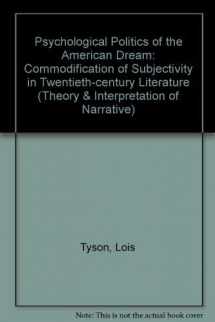
Psychological Politics of the American Dream: The Commodification of Subjectivity in Twentieth-Century American Literature (The Theory and Interpret)
Book details
Summary
Description
Because literature is a repository of both a society's ideologies and its psychological conflicts, it has the capacity to reveal aspects of a culture's collective psyche: the ways in which ideological investments reveal the nature of individuals' psychological relationship to the world. While it is reasonable to assume that our national literature would offer a fertile field in which to explore the interaction between the ideological and psychological dimensions of American life, critics generally have kept these two domains separate, and the dominant model has consisted of an archaic notion of the individual in society. The two are seen as interactive but essentially discrete entities, often in polarized opposition in which the autonomous individual is a victim of an antagonistic American society.
Lois Tyson's ground-breaking work, Psychological Politics of the American Dream, seeks to draw together these disparate spheres by applying a new dialectical model of existential subjectivity to five representative works of twentieth-century American literature: Edith Wharton's The House of Mirth, F. Scott Fitzgerald's The Great Gatsby, Arthur Miller's Death of a Salesman, Thomas Pynchon's The Crying of Lot 49, and Joseph Heller's Something Happened. While previous literary analyses frequently portray the individuals in these works in opposition to society, Tyson ably demonstrates that the texts instead reveal the intersection of psyche - or the self as a product of individual psychological experience - and the socius - or the self as social product - in the American dream, which through its inherent relation to commodification responds to our desire to escape existential inwardness: that anxious awareness of ourselves as creatures, in Heidegger's words, whose "very being is at issue" in an uncertain world.
These five works illustrate the diversity and complexity of the psychological realities American literature can reveal, given a model of subjectivity adequate to the task. Taken together, they point to a growing collusion of psyche and socius: the desire to escape existential inwardness becomes an increasingly "viable" project with the increasing commodification of American national culture.


We would LOVE it if you could help us and other readers by reviewing the book
Book review



